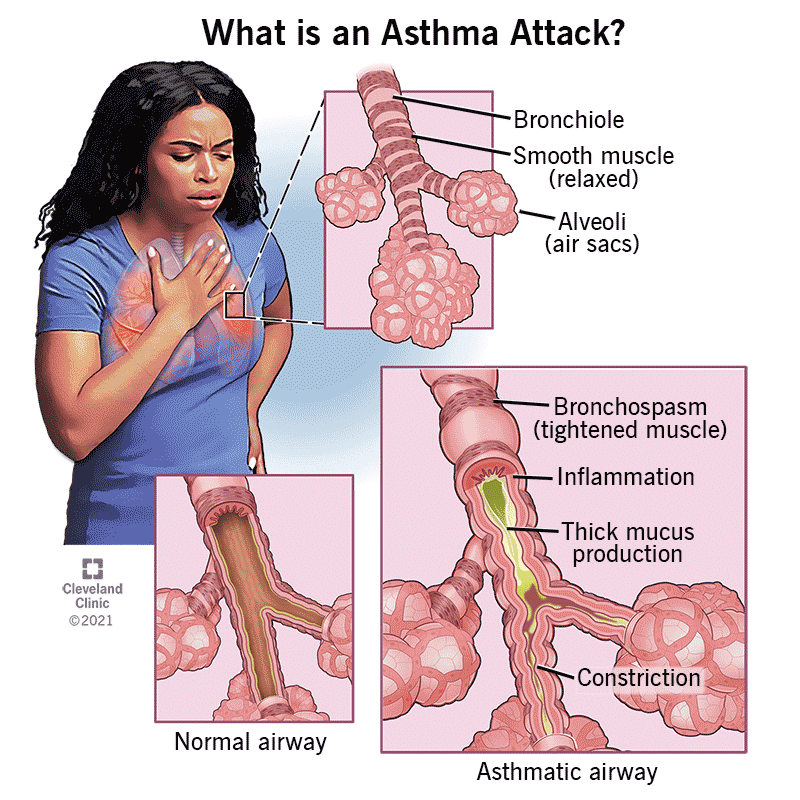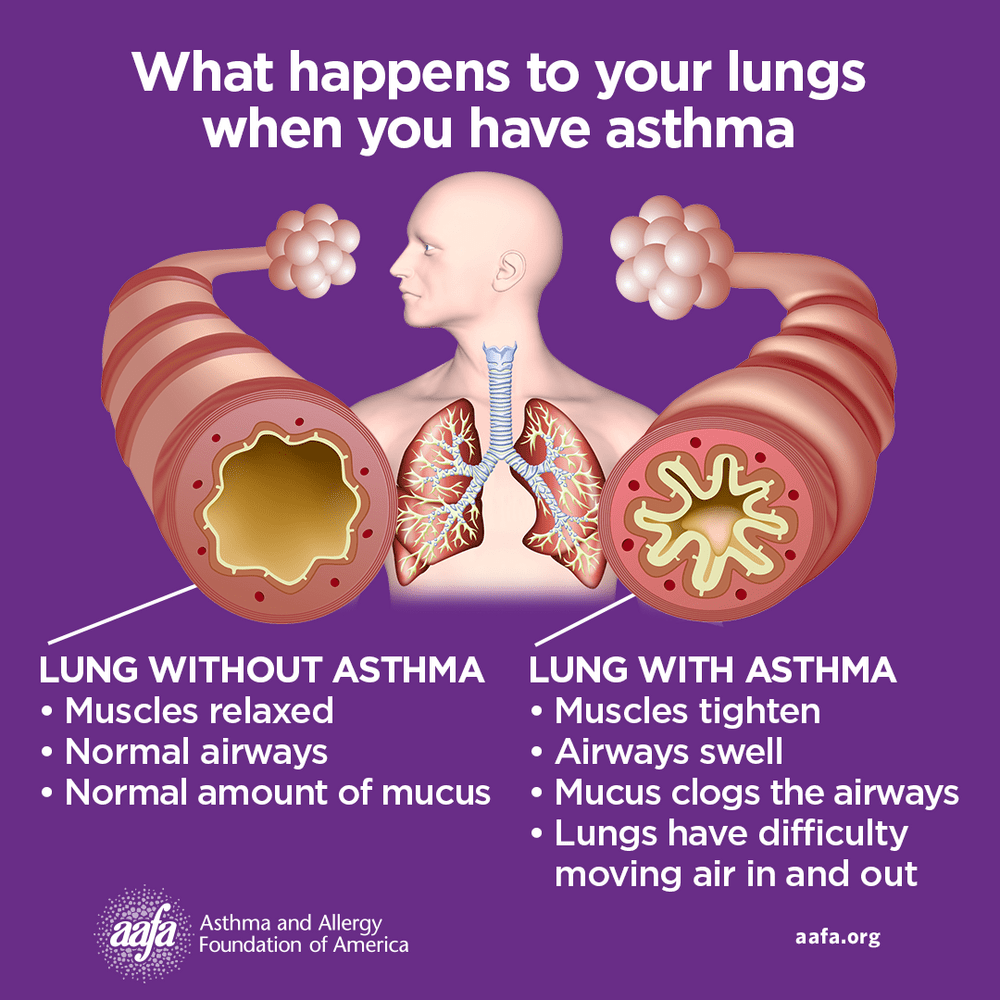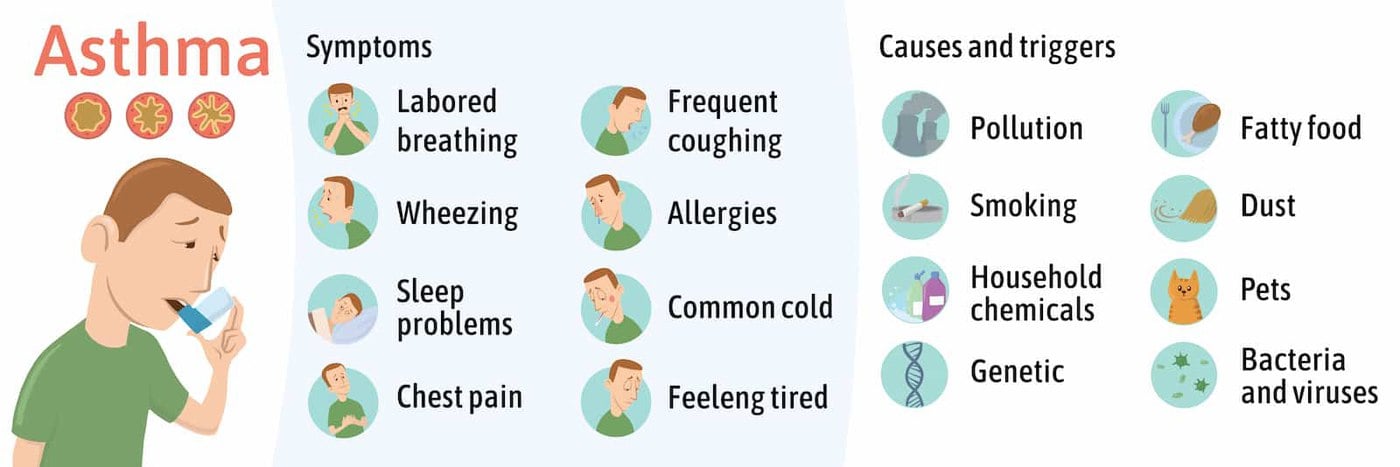All About Asthma

Posted on October 16, 2023

Introduction
Bronchial asthma (or asthma) is a lung disease. Your airways get narrow and swollen and are blocked by excess mucus. Medications can treat these symptoms.
Asthma is a chronic respiratory condition characterized by inflammation and narrowing of the airways, leading to difficulty in breathing. It affects millions of people worldwide, impacting their quality of life. Understanding the causes, effects, and treatment options for asthma is crucial for managing this condition effectively.
What is an asthma attack?

When you breathe normally, muscles around your airways are relaxed, letting air move easily and quietly. During an asthma attack, three things can happen:
Bronchospasm:
The muscles around the airways constrict (tighten). When they tighten, it makes your airways narrow. Air cannot flow freely through constricted airways.
Inflammation:
The lining of your airways becomes swollen. Swollen airways don’t let as much air in or out of your lungs.
Mucus production: During the attack, your body creates more mucus. This thick mucus clogs airways.
When your airways get tighter, you make a sound called wheezing when you breathe, a noise your airways make when you breathe out. You might also hear an asthma attack called an exacerbation or a flare-up. It’s the term for when your asthma isn’t controlled.
Types of Asthma

Asthma is broken down into types based on the cause and the severity of symptoms. Healthcare providers identify asthma as:
Intermittent:
This type of asthma comes and goes so you can feel normal in between asthma flares.
Persistent: Persistent asthma means you have symptoms much of the time. Symptoms can be mild, moderate or severe. Healthcare providers base asthma severity on how often you have symptoms. They also consider how well you can do things during an attack.
Asthma has multiple causes:
Allergic:
Some people’s allergies can cause an asthma attack. Allergens include things like molds, pollens and pet dander.
Non-allergic: Outside factors can cause asthma to flare up. Exercise, stress, illness and weather may cause a flare.
Asthma can also be:
Adult-onset:
This type of asthma starts after the age of 18.
Pediatric: Also called childhood asthma, this type of asthma often begins before the age of 5, and can occur in infants and toddlers. Children may outgrow asthma. You should make sure that you discuss it with your provider before you decide whether your child needs to have an inhaler available in case they have an asthma attack. Your child’s healthcare provider can help you understand the risks.
In addition, there are these types of asthma:
Exercise-induced asthma:
This type is triggered by exercise and is also called exercise-induced bronchospasm.
Occupational asthma: This type of asthma happens primarily to people who work around irritating substances.
Causes of Asthma

Asthma can be triggered or exacerbated by various factors, including:
- Allergens: Pollen, dust mites, pet dander, mold spores, and certain foods can trigger asthma symptoms in susceptible individuals.
- Respiratory Infections: Viral respiratory infections, such as the common cold, can worsen asthma symptoms.
- Environmental Factors: Exposure to tobacco smoke, air pollution, and strong odors or fumes can contribute to asthma development.
- Genetic Predisposition: Family history of asthma or allergies can increase the risk of developing asthma.
Effects of Asthma
:max_bytes(150000):strip_icc()/the-effect-of-asthma-on-long-term-health-200590-v1-66a6cdff8f3748e5bf309e3c6b207af8.jpg)
Untreated or poorly managed asthma can have a significant impact on an individual's life. Common effects of asthma include:
- Shortness of Breath: Asthma can lead to difficulty in breathing, especially during physical activity or at night.
- Coughing and Wheezing: Persistent coughing and wheezing are common asthma symptoms.
- Reduced Physical Activity: Asthma may limit a person's ability to engage in physical activities, leading to a sedentary lifestyle.
- Disrupted Sleep: Nighttime symptoms can lead to poor sleep quality, impacting overall well-being.
Treatment of Asthma
Effective management of asthma involves a combination of medication and lifestyle adjustments. Treatment options include:
- Controller Medications: These are taken regularly to control inflammation and prevent symptoms.
- Reliever Medications: These provide quick relief during asthma attacks by relaxing the airways.
- Environmental Control: Avoiding triggers and creating an asthma-friendly environment can reduce symptom severity.
- Regular Monitoring: Working with a healthcare provider to track symptoms and adjust treatment as needed.
Asthma in Pakistan
In Pakistan, asthma is a significant health concern. Factors such as air pollution, exposure to allergens, and limited access to healthcare contribute to the prevalence of asthma. Efforts are being made to raise awareness, improve diagnosis, and provide effective treatment options for individuals with asthma in Pakistan.
Can asthma be cured?
No. Asthma can’t be cured, but it can be managed. Children may outgrow asthma as they get older.
Why is my asthma worse at night?
Asthma that gets worse at night is sometimes called nighttime asthma or nocturnal asthma. There are no definite reasons that this happens, but there are some educated guesses. These include:
- The way you sleep: Sleeping on your back can result in mucus dripping into your throat or acid reflux coming back up from your stomach. Also, sleeping on your back puts pressure on your chest and lungs, which makes breathing more difficult. However, lying face down or on your side can put pressure on your lungs.
- Triggers in your bedroom and triggers that happen in the evening: You may find your blankets, sheets and pillows have dust mites, mold or pet hair on them. If you’ve been outside in the early evening, you may have brought pollen in with you.
- Medication side effects: Some drugs that treat asthma, such as steroids and montelukast, can affect your sleep.
- Air that’s too hot or too cold: Hot air can cause airways to narrow when you breathe in. Cold air is an asthma trigger for some people.
- Lung function changes: Lung function lessens at night as a natural process.
- Asthma is poorly controlled during the day: Symptoms that aren’t controlled during the day won’t be better at night. It’s important to work with your provider to make sure your asthma symptoms are controlled both day and night. Treating nighttime symptoms is very important. Serious asthma attacks, and sometimes deaths, can happen at night.
What should I know about COVID-19 and asthma?
If you have asthma that is moderate-to-severe, or if your asthma symptoms aren’t well controlled, you’re at greater risk of having to be hospitalized if you get COVID-19. Therefore, you should wear a mask if you go to indoor spaces with other people, get vaccinated and avoid exposure to people who have the virus.
A note from Cleveland Clinic
Many people live fulfilling lives with asthma. Some professional athletes with asthma have set records in their sports. Your healthcare provider can help you find the best way to manage your asthma. Talk to your healthcare provider about how to control your symptoms.
